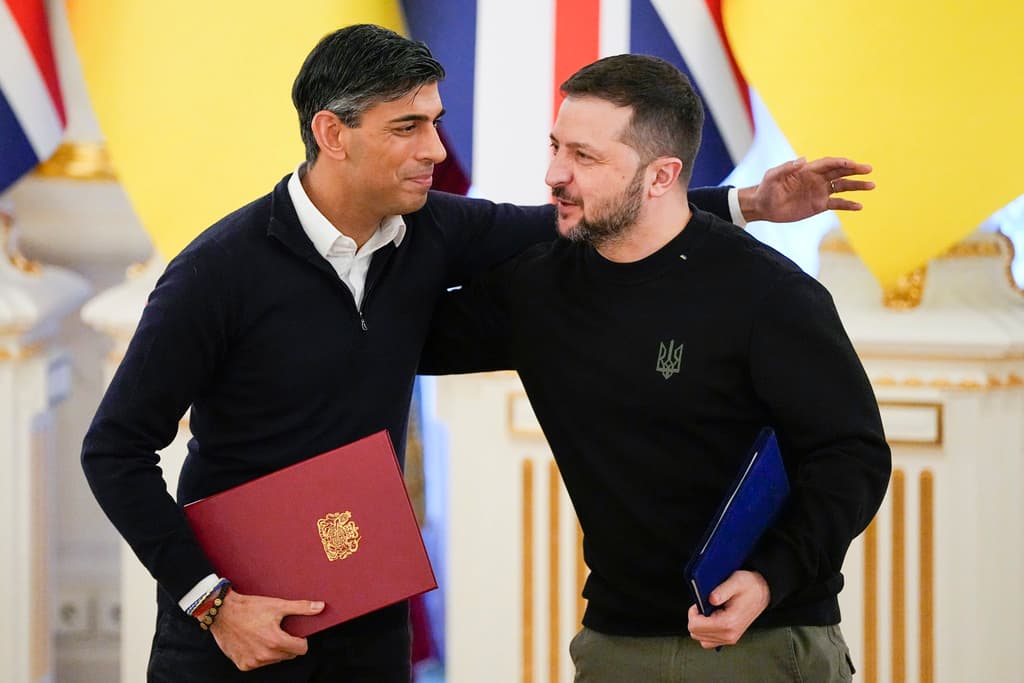Zelensky’s 10-Point Peace Plan, Being Discussed at Davos, Likely To Fizzle as Russia Balks
Biden downshifts to offering support to Ukraine for ‘as long as we can’ from ‘as long as it takes.’

A presidential plea in the Times of London, a high-profile trip to Switzerland, and various degrees of hand-wringing everywhere over more assistance for an ongoing war effort in Ukraine will not be enough for Kyiv’s 10-point peace plan to become a reality. Not immediately, anyway. That, of course, is primarily Russia’s fault.
As the Swiss prepare to swap skis for a few days of high-minded chit chat and wine soirées at Davos, and as war in the Middle East dominates headlines, Ukrainian officials will be hoping to keep their embattled country’s material needs high on the agenda. Organizers of the World Economic Forum say the parley is taking place “against the most complicated geopolitical and geo-economic backdrop of the last few decades.”
Ukraine’s president, Volodymyr Zelensky, is expected to attend. Just before the official start of Davos today, the Ukrainian and Swiss governments hosted dozens of national security advisers to rally support for Mr. Zelensky’s peace plan. That closed-door meeting was the fourth official such gathering of its kind and the biggest to date, following previous get-togethers at Copenhagen, Jeddah, and, in October, at Malta.
Officials involved in the talks had hoped the meeting in Malta would lead to the setting of a date for a global “Peace Formula” summit to build a coalition of support for the plan, which Mr. Zelensky drafted in December 2022. It includes calls for the restoration of Ukraine’s territorial integrity, the withdrawal of Russian troops, protection of food and energy supplies, assurances on nuclear safety, and the release of all Ukrainian prisoners of war.
Previous meetings, though, have ended without a final declaration or a set summit date. Chairmen in the previous meeting produced a joint statement referring to the participants’ commitment to just and lasting peace, but not much more. This time around, the Swiss foreign minister, Ignazio Cassis, told reporters that “the participation of the Brics alliance is very important because these countries have a relationship with Russia.”
Communist China dispatched no one to Sunday’s meeting, and the position of neutral countries such as India, Indonesia, and Saudi Arabia — where President Putin made an official visit last month — are unchanged. Goodwill at Davos this week is also not likely to sway South Africa and Brazil as they continue to pursue close economic and diplomatic ties with Russia.
On Sunday, Mr. Zelensky’s chief of staff, Andriy Yermak, called on Beijing to have its say in any future peace formula discussions. The South China Morning Post reported that the Chinese premier, Li Qiang, would lead a delegation to Davos for the official part of the forum, and hinted that he could be meeting with Mr. Zelensky.
This year the Davos gathering takes place amid a backdrop of faltering Western support for Ukraine, with disagreements in Europe about how much to send Kyiv and how, and a package of American funding still tied up in Congress. A Pentagon report that more than $1 billion worth of military aid was improperly monitored could give political cover to some Republican lawmakers who seek to phase out security assistance altogether.
Moscow, in the meantime, has shown no real willingness to negotiate with Ukraine. Over the weekend the Kremlin again spoke the language it appears to know best: the wordless whooshing of more missiles and drones aimed at targets across Ukraine.
There had been some talk of organizing a summit to begin implementing the 10-point plan that could take place in February, but European officials over the past few days have been less optimistic that such a meeting can happen anytime soon. The war on Hamas and various repercussions are making it harder to win over diplomatic support for Kyiv’s peace plan blueprint.
Notably, the peace formula talks do not involve Russia, which launched its full-scale invasion of Ukraine in February 2022 and has occupied nearly a fifth of the country. Moscow has rejected the initiative, saying it would be impossible to implement. Ukrainian officials, for their part, are also not interested in negotiations — which are not the same thing as a cease-fire — that could force them to cede territory to Russia.
In recent months, EU and Biden administration officials have been increasingly worried that Kyiv’s growing shortage of financial means and ammunition could offer Russia an opportunity to push ahead. Mr. Zelensky last week warned that a cease-fire would merely serve Moscow’s interest to rebuild its forces for further attacks in the future.
In recent months Russia has steadily built up a firepower advantage over Ukraine by expanding military production and cementing weapons-supply deals to acquire considerable amounts of North Korean shells and Iranian-made drones. That could be part of the reason why most Western officials insist they won’t pressure Kyiv into cease-fire talks that looked premature before Davos — and will still look like wishful thinking after the week’s high-profile kibitzing ends.
Secretary Blinken will also be seen in the Alpine town this week. No doubt Mr. Zelensky will be asking him why President Biden has downshifted to offering support to Ukraine for “as long as we can” from “as long as it takes.” A cold place closer to home might have something to do with that.

